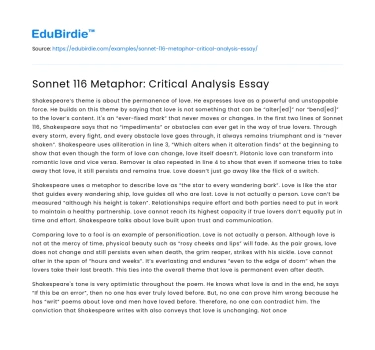Shakespeare’s theme is about the permanence of love. He expresses love as a powerful and unstoppable force. He builds on this theme by saying that love is not something that can be “alter[ed]” nor “bend[ed]” to the lover’s content. It's an “ever-fixed mark” that never moves or changes. In the first two lines of Sonnet 116, Shakespeare says that no “impediments” or obstacles can ever get in the way of true lovers. Through every storm, every fight, and every obstacle love goes through, it always remains triumphant and is “never shaken”. Shakespeare uses alliteration in line 3, “Which alters when it alteration finds” at the beginning to show that even though the form of love can change, love itself doesn’t. Platonic love can transform into romantic love and vice versa. Remover is also repeated in line 4 to show that even if someone tries to take away that love, it still persists and remains true. Love doesn’t just go away like the flick of a switch.
Shakespeare uses a metaphor to describe love as “the star to every wandering bark”. Love is like the star that guides every wandering ship, love guides all who are lost. Love is not actually a person. Love can’t be measured “although his height is taken”. Relationships require effort and both parties need to put in work to maintain a healthy partnership. Love cannot reach its highest capacity if true lovers don’t equally put in time and effort. Shakespeare talks about love built upon trust and communication.
Comparing love to a fool is an example of personification. Love is not actually a person. Although love is not at the mercy of time, physical beauty such as “rosy cheeks and lips” will fade. As the pair grows, love does not change and still persists even when death, the grim reaper, strikes with his sickle. Love cannot alter in the span of “hours and weeks”. It’s everlasting and endures “even to the edge of doom” when the lovers take their last breath. This ties into the overall theme that love is permanent even after death.
Shakespeare's tone is very optimistic throughout the poem. He knows what love is and in the end, he says “If this be an error”, then no one has ever truly loved before. But, no one can prove him wrong because he has “writ” poems about love and men have loved before. Therefore, no one can contradict him. The conviction that Shakespeare writes with also conveys that love is unchanging. Not once in the sonnet does he waver. He writes so matter-of-factly that it cannot be discounted.






 Stuck on your essay?
Stuck on your essay?

